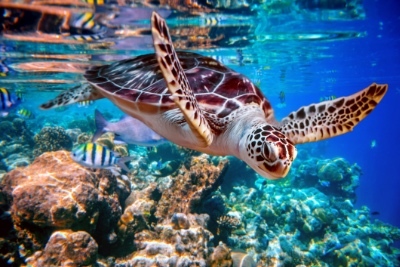
On 4 March 2023, the world came together to protect our oceans for the benefit of future generations. After 38 hours of talks, that were preceded by 10 years of negotiation, the United Nations' High Seas Treaty was signed at the UN's headquarters in New York.
 The treaty sets out to protect 30% of the wold's oceans by 2030, a massive increase on the 1.2% that are currently protected. Almost two thirds of the high seas - ocean that lies outside national boundaries - will be protected by the treaty, which provides the legal framework for establishing marine protected areas (MPAs) to protect wildlife from being lost.
The treaty sets out to protect 30% of the wold's oceans by 2030, a massive increase on the 1.2% that are currently protected. Almost two thirds of the high seas - ocean that lies outside national boundaries - will be protected by the treaty, which provides the legal framework for establishing marine protected areas (MPAs) to protect wildlife from being lost.
Disagreements over fishing rights and funding had held up the negotiations for years. The new treaty will place limits on how much fishing can take place, restrict the routes of shipping lanes and impose controls on deep sea mining, which takes place from the sea bed 200 metres or more below the surface. Mining activities under the sea are a problem because they can destroy animals' breeding grounds, cause noise pollution and release toxins into the ocean which affect marine life.
The International Union for Conservation of Nature (IUCN)'s latest assessment of global marine species found that almost 10% were found to be at risk of extinction. So far, humans have recorded around 230,000 marine species, but the difficulties of operating in the deep oceans mean that it's thought there could actually be over two million species in the world's oceans.
Ocean ecosystems produce half of the world's oxygen, are the planet's largest carbon sink, absorbing carbon dioxide. They also constitute 95% of the world's biosphere.
Countries will still need to meet again to formally ratify the treaty, so the process is not finished yet. But the fact that the agreement has now been signed is a huge step forward.
Photos credits:
Sea turtle: Photo 130672165 © Andreyi Armiagov | Dreamstime.com
Humpback whale breaching off the waters of Puerto Lopez, Ecuador. Photo 43910487 © Paul Wolf | Dreamstime.com
